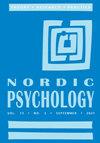Editorial
IF 1.1
4区 心理学
Q4 PSYCHOLOGY, MULTIDISCIPLINARY
引用次数: 0
Abstract
This issue of Nordic Psychology has a number of really interesting articles to be read during the wonderful Nordic spring. The articles cover important and interesting themes like personal therapy, eating disorders, interview quality, Hong Psychological Reactance Scale and job embeddedness. In the first article in this issue “Personal therapy and the personal therapist” Fredrik Moe and Jens Thimm summarized the theoretical and empirical literature on personal therapy and its effects on the professional development of therapists and on patient treatment. In a systematic review of the literature, the article demonstrated a convergence between reported benefits from personal therapy and therapist qualities. Furthermore, the articled showed that psychotherapists have rationales (e.g., improvement of emotional and mental functioning and a better understanding of the dynamics between therapist and patient) for attending personal therapy, and self-report studies indicated that they experience benefits related to the important characteristics of effective therapists (e.g., empathy, genuineness, formation of a working alliance). Studies of personal therapy and therapist development found no causal connection or correlation with or effects on patient treatment. In the second article in this issue “«In Solitude is Safeness»: a Patient Perspective on Eating Disorders in the Context of Multiple Childhood Trauma” Malin Olofsson, Hanne Oddli, KariAnne Vrabel and Asle Hoffart described variation and common features in the lived experiences of eating disorders patients with childhood physical, emotional, and/or sexual abuse and neglect. Semi-structured interviews were conducted post-treatment with nine participants aged 25-59. The results showed eating disorders onset was described as related to the failure of parental figures and their functions, whereas eating disorders maintenance related to the highly isolative and self-perpetuating nature of the disorder. Furthermore, four master themes emerged across eating disorders and trauma categories: 1) Shape and weight as regulators of closeness and distance, 2) eating disorders as a sanctuary for counteracting feelings of helplessness and incompetence, 3) eating disorders as a designated caregiver, and 4) eating disorders filling an existential emptiness while emptying unwanted emotions. In third article in this issue “Transfer of Simulated Interview Training Effects into Interviews with Children Exposed to a Mock Event” Francesco Pompedda, Annegrete Palu, Kristjan Kask, Karolyn Schiff, Anna Soveri, Jan Antfolk and Pekka Santtila studied if repeated feedback in interviews improve the quality of the interviews. In the study, 40 psychologists were trained (Study I) and 69 psychology students (Study II). In both studies, half of the participants received no feedback (control group) while the other half received feedback (experimental group) on their performance during repeated interviews with avatars. The analyses of transfer effects showed that, compared to controls, interview quality was better in the experimental group. Although the two studies did not show statistically significant training effects for all investigated variables, the article concluded that interview quality can be improved using avatar training and that there is transfer into actual interviews with children. In the fourth article in this issue “The factorial structure of the Hong Psychological Reactance Scale in two Finnish samples” Otto Waris, Linda Karlsson; Jan Antfolk, Linnea Karlsson, Hasse Karlsson and Anna Soveri question the interpretability and usefulness of the Hong Psychological Reactance Scale as a measure of trait reactance. In a two-part study,社论
本期《北欧心理学》有许多非常有趣的文章,在美妙的北欧之春可以阅读。文章涵盖了个人治疗、饮食失调、面试质量、洪心理反应量表和工作嵌入等重要而有趣的主题。在本期的第一篇文章“个人治疗和个人治疗师”中,Fredrik Moe和Jens Thimm总结了关于个人治疗及其对治疗师专业发展和患者治疗的影响的理论和实证文献。在对文献的系统回顾中,文章证明了个人治疗的益处与治疗师素质之间的趋同。此外,文章表明,心理治疗师有参加个人治疗的理由(例如,改善情绪和心理功能,更好地理解治疗师和患者之间的动态),自我报告研究表明,他们体验到的好处与有效治疗师的重要特征有关(例如,同理心、真诚、形成工作联盟)。对个人治疗和治疗师发展的研究没有发现与患者治疗的因果关系、相关性或影响。在本期的第二篇文章“«孤独是安全»:儿童多重创伤背景下饮食障碍的患者视角”中,Malin Olofsson、Hanne Oddli、Kariane Vrabel和Asle Hoffart描述了患有儿童身体、情感和/或性虐待和忽视的饮食障碍患者生活经历的变化和共同特征。治疗后对9名年龄在25-59岁的参与者进行了半结构化访谈。研究结果表明,饮食失调的发作被描述为与父母形象及其功能的失败有关,而饮食失调的维持与该疾病的高度孤立性和自我延续性有关。此外,饮食失调和创伤类别中出现了四个主要主题:1)形状和重量是亲密和距离的调节器,2)饮食失调是抵抗无助和无能感的避难所,3)饮食失调作为指定的照顾者,4)饮食失调填补了存在的空虚,同时清空了不想要的情绪。在本期的第三篇文章“将模拟面试训练效果转化为对暴露于模拟事件中的儿童的面试”中,Francesco Pompedda、Annegrete Palu、Kristjan Kask、Karolyn Schiff、Anna Soveri、Jan Antfolk和Pekka Santtila研究了面试中的重复反馈是否能提高面试质量。在这项研究中,培训了40名心理学家(研究一)和69名心理学学生(研究二)。在这两项研究中,一半的参与者(对照组)没有收到任何反馈,而另一半(实验组)在对化身的重复采访中收到了关于他们表现的反馈。迁移效应分析表明,与对照组相比,实验组的面试质量更好。尽管这两项研究并没有显示出对所有调查变量的显著训练效果,但文章得出结论,使用化身训练可以提高面试质量,并且可以转移到对儿童的实际面试中。在本期第四篇“洪心理反应量表在两个芬兰样本中的因子结构”中,Otto Waris,Linda Karlsson;Jan Antfolk、Linnea Karlsson、Hasse Karlsson和Anna Soveri质疑洪心理反应量表作为特质反应测量的可解释性和有用性。在由两部分组成的研究中,
本文章由计算机程序翻译,如有差异,请以英文原文为准。
求助全文
约1分钟内获得全文
求助全文

 求助内容:
求助内容: 应助结果提醒方式:
应助结果提醒方式:


